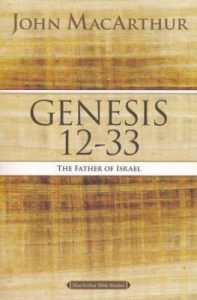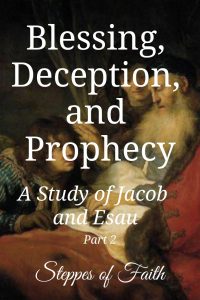
“God has dealt graciously with me.” Genesis 32:11
Last week in Part One of this discussion about Jacob and Esau, we looked at Jacob stealing Esau’s birthright and his blessing. Esau was so angry with his brother that he vows to kill him. So, Jacob ran away to his Uncle Laban’s farm where he worked for the next twenty years.
During all that time, Laban tricked Jacob into marrying his oldest daughter and not the one Jacob was after (Rachel). He also perfected his sheep mating skills. But most of all, he hasn’t talked to Esau. As far as he’s concerned, Esau still wants to kill him.
Jacob is growing up, both physically and spiritually. His whole outlook on life is changing, and he’s no longer content to keep Esau’s blessing. He knows what he has to do. His only problem is he doesn’t know what to expect.
Jacob and Esau Reunite
Fourteen years go by in which Jacob finally wins Rachel’s hand in marriage, he has a wrestling match with an angel who dislocates his hip, and God changes his name to Israel (Genesis 32:22-32).
Jacob also decides to reconcile with Esau. In chapter 32, Jacob sends messengers to Esau telling him that he has earned oxen, donkeys, flocks, and male and female servants, and he wants to give them to Esau. Esau responds by saying he’ll come to Jacob, and oh, by the way, he’s bringing 400 men with him.
Jacob eventually sees Esau coming with the four hundred men, and he’s terrified. He has no idea if Esau will kill him or not. He decides to be brave and gathers his family together to meet his estranged twin brother, limping the whole way. He’s astonished when Esau runs to meet him plus hug and kiss him in verse four.
He bows down to Esau seven times fulfilling Isaac’s words to Esau, “May the sons of your mother bow down to you (Genesis 27:29),” which is a gift of power. Jacob has given his power—and his blessing—back to Esau.
Jacob also calls Esau “my lord” seven times. And, he calls himself “your servant” five times.
A battle to be more generous to the other begins. Jacob eventually wins after Esau, who initially refused to take anything from Jacob, finally agrees to take back the blessing originally meant for him by their father.
“’Please, take my blessing that is brought to you because God has dealt graciously with me, and because I have enough.’ So he urged [Esau], and he took it.” (v.11)
So, all’s well that ends well.
Blessings for All
Wait! Wasn’t the older supposed to serve the younger? Why is Jacob acting this way?
It’s because Jacob finally understands his sin, and he wants to set things right. He finally admits he made a mistake.
And because Esau took back the blessing, it meant he was now responsible for watching over Jacob’s family, both physically and financially. This fulfills the secondary blessing Isaac gave Esau, “And you shall serve your brother.” (Genesis 27:40)
Indeed, the older would have to serve the younger.
Jacob was obviously blessed despite his sin. He was a very wealthy man with a large family and lots of land and animals. And just as God had intended, his family carried on the covenantal line leading to the birth of Jesus Christ. We don’t know what else God would have done to make sure Jacob carried the covenantal line, but we must believe that things eventually worked out according to God’s will.
Esau was indeed blessed too. Though he sinned greatly along the way by marrying Hittite women (a huge no-no), God still blessed him. And just as Isaac had said, when Esau got restless enough, he took off the yoke of his brother. In other words, he was no longer upset with Jacob, and he offered forgiveness.
But the consequences of Jacob’s sin weren’t over yet. Edom and Israel would continue to fight each other for many years. Every time Edom repelled Israel’s attempts at control, the same yoke was taken off.
The Older Serves the Numerous
But, here’s the twist in all this.
According to Rabbi Jonathan Sacks, the phrase in Rebekah’s prophecy “the older shall serve the younger” may not be quite right according to the Midrash, a set of Hebrew commentaries with Biblical text. Here’s what he has to say about it:
“The words ve-rav yaavod tsair seem simple: “the older will serve the younger.” Returning to them in the light of subsequent events, though, we discover that they are anything but clear. They contain multiple ambiguities (in Hebrew, “chidah”).
‘The first (noted by Radak and R. Yosef ibn Kaspi) is that the word “et”, signaling the object of the verb, is missing. Normally in biblical Hebrew the subject precedes, and the object follows the verb, but not always. In Job 14:19 for example, the words avanim shachaku mayim mean “water wears away stones,” not “stones wear away water.” Thus, the phrase might mean “the older shall serve the younger,” but it might also mean “the younger shall serve the older.”
‘The second is that rav and tsa’ir are not opposites, a fact disguised by the English translation of rav as “older.” The opposite of tsa’ir (“younger”) is bechir (“older” or “firstborn”). Rav does not mean “older.” It means “great” or possibly “chief.” This linking together of two terms as if they were polar opposites, which they are not – the opposites would have been bechir/tsa’ir or rav/me’at – further destabilizes the meaning. Who was the rav? The elder? The leader? The chief? The more numerous? The word might mean any of these things.”
What this means for the prophecy is that the “older will serve the younger” might actually be more like “the older will serve the more numerous,” the more numerous meaning the nation of Israel. Or, “The older will serve the leader,” where the leader is Jacob in keeping the prophecy and continuing the covenantal line perhaps.
Even after looking at it this way, the prophecy still came true.
We All Make Mistakes
Rebekah, in her effort to fulfill prophecy and continue God’s covenant, made a big mistake. But we might argue that she was trying to make the best decision she could at the time. Jacob might have had some misgivings about it, but he trusted his mother completely.
We can also say that Esau behaved honorably with Isaac and later too with Jacob when they met again after twenty-two years. And Isaac wasn’t as easily fooled as we might think. He knew something was up all along, yet he still gave both Jacob and Esau the blessings he intended for each of them.
The story of Jacob and Esau is rich with themes. We see lessons in parenting, honesty, honor, sibling rivalry, making mistakes, forgiveness, prophecy fulfilled, and tradition throughout Genesis 25-33. We also see a series of mistakes.
Everyone makes mistakes. Everyone makes bad decisions even if it is meant for good. It’s only by looking in hindsight that we realize we were wrong or can see where we should have gone another way. After some reflection, we can get the full meaning of things, and if we’re wise, we’ll learn and grow from it.
Thankfully, God offers His forgiveness. He has redeemed us through the blood of His son, Jesus Christ, and He has given each of us our own blessing just as He did for Jacob and Esau. It’s a blessing that is extremely special and unique to only you.
So, perhaps the greatest lesson we can learn from Jacob and Esau is not about parenting, sibling rivalry, or prophecy, but rather to never try to get someone else’s blessing. Be content with the one God has already given you.
Your Turn
Have you ever thought you might have stolen someone else’s blessing? How did you set things right? Leave your comments below. Let’s talk about how to be content with what God has already given us.
Further Reading
If you would like to more in-depth about the history of Abraham and his family up through his grandsons, Jacob and Esau, check out John MacArthur’s “Genesis 12-33” as part of his MacArthur Bible Series. World-renowned Pastor MacArthur guides readers through this famous historical period by studying up-close the lives of Sarah, Hagar, Ishmael, Isaac and more as well as looking carefully at doctrinal themes such as “Covenant and Obedience” and “Wrestling with God.” Christianbook has it on sale for only $5 right now! You can order yours here (not an affiliate link).
